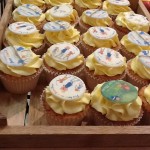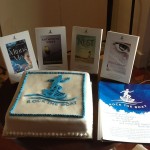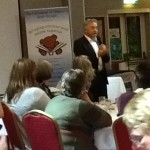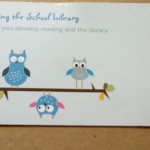Possibly my favourite “Thing”. I have to admit that I am a bit of a conference junkie, particularly if they are associated with children’s books. I totally agree with all that Caroline has said and it is a shame that training managers and senior staff do not always think so as well.
The first conference that I ever attended was an AAL one (the precursor of Career Development group) and it was held in Scarborough in November 1972(?). We ended up travelling back to Manchester in a Morris 1000 during a snowstorm on the M62; memorable but not for the right reasons.

Did I mention cake?
My main conference links have been with Youth Libraries group, which I have attended most years since 1997. Part of that has been because I was the exhibition manager for 10 years and chair of the group in 2010; the latter gave me the opportunity to set the theme for conference and work with others to create the programme. This really made me realize what a tough job it is to co-ordinate all the speakers, workshops, publishers etc. Many years ago I wrote an article for the Youth Library Review about attending conference for the first time. Perhaps the piece of advice that still gets quoted is to take two cases (one inside of the other) so that you can carry all of the goodies that you pick up at exhibitions. I know this will depend on the type of conference but there are usually leaflets, cards, pens and books and even soft toys if you are lucky.

And more cake!
Going to your first conference can be very daunting, even for the most gregarious people. I know YLG in 1997 was terrifying to begin with. Luckily an ex-colleague, Sarah Wilkie was on the organizing committee, so that made me feel better. I was then lucky enough to be spoken to at the bar by another delegate, this was Miranda Mckearney and she was so kind, asking me about my background etc. On hearing that I had worked in Portsmouth she introduced me to a librarian from there, it was Peter Bone and we have worked together at Waterlooville library. Suddenly the world seemed a much smaller and friendlier place and I had a really great conference.
Since then I have become a regular at the School Library Association Conferences and they have greatly added to my knowledge and understanding of the special circumstances in schools. I have also been to a couple of conferences for the Federation of Children’s Book Groups. This is totally different in that it is not for a professional body but just for those interested in promoting books to children.

Frank Cottrell Boyce
Somehow I always seem to miss the Cilip Conference (Umbrella), but I must get there one year because the range of topics is something to really challenge me and it would give me the chance to meet colleagues in other areas of the profession. I would definitely be taking my business cards with me. Far from being on the way out I find that I receive a lot of cards and it is good to be able to offer my own in return. Perhaps the most important elements of the card were the design and the wording that I wanted on it. It had to be professional yet friendly, informative and yet not overloaded with information. I hope you all like what I ended up with. Yes, I am rather keen on Owls. 
I suspect that for many of us the main issue about conferences is the cost. Local authorities, schools and businesses are having to look at the amount they spend on training and a conference does not always highlight the ‘learning outcomes’, so it is imperative that we can justify our attendance in terms of benefits to our employer and additional skills in the workplace. However I do think that we all have some responsibility for our professional development and if the subject matter is important then you should think about funding yourself. I understand that this is not possible if you are on a low wage, no wage or if travel costs etc put it all out of range. Luckily there are still offers of support given by various professional bodies, so be on the lookout for this.
Well I am off to the YLG conference in Glasgow in October, so will get a chance to meet up with friends, learn a lot about Diversity in Publishing and find out what books are coming out in the next few months. I have also got two more conferences pencilled into the diary for next year. Conferences are amazing events. Not only do they provide information, discussion and news but they also act as a huge support mechanism for those who attend. You learn things but you also have your own knowledge validated and your enthusiasm is boosted. In this day and age these are important elements. I hope to meet some of you at conferences in the future.
Just as a little footnote, I have signed up for an online conference run by Digital Shift in October. Here is the link if anyone is interested.
https://event.on24.com/eventRegistration/EventLobbyServlet?target=registration.jsp&eventid=1016943&sessionid=1&key=1A53E7363BFA13D45F7E562DDEA83B24&sourcepage=register&partnerref=ljeblast





